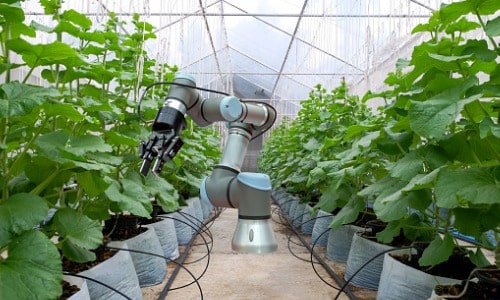Features
Rutger Bregman, a precocious historian and author of bestselling book Utopia for Realists, shared a memorable anecdote about automation: several decades ago, Henry Ford’s grandson gave Walter Reuther, the president of the United Automobile Workers, a tour of Ford’s new automated facilities. In jest, Ford asked Reuther, “Walter, how will you get these robots to pay your union dues?” The union leader replied, “Henry, how will you get these robots to buy your cars?”
Busted Cubicle focuses on issues that affect American workers, including the industries disrupted by automation; careers on the rise for the iGen (i.e., the post-Millennial generation); and the varied forces transforming the U.S. employment landscape.

Best Companies for Remote Work in 2025
The concept of working remotely has been around for decades, primarily driven by technological advancements and the need for flexible work arrangements. However, the Covid-19 pandemic brought about an unprecedented shift in the remote work culture. With the global health crisis necessitating social distancing measures, organizations were forced to embrace remote work on a massive scale. Companies quickly adapted to remote work, leveraging technology to ensure business continuity and the well-being of their employees.

Examining the WFH Backlash: Is a Return to the Office Inevitable?
The option to work from home any number of days per week has contributed to a marked rise in the number of women in the workforce. For the individual, flexibility, work-life balance, and reduced commute are all immediate benefits when working from home. The removal of those benefits would also be immediately felt in a return to the office, which is part of why working from home remains resoundingly favored by employees and middle managers.

Affordable, Comfortable, and Not Hideous: The Best WFH Attire
Gone are the days when formal suits, ties, and high heels dominated the office landscape. Instead, remote work has ushered in an era where comfort is preferred to formality, allowing for a more relaxed dress code that ranges from business casual to cozy athleisure.

How to Combat Remote Worker Loneliness and Isolation
For remote workers, loneliness can be exacerbated by the lack of face-to-face social interactions and the blurring of work-life boundaries. Often, remote workers may feel detached from their team's culture and camaraderie, adding to the sense of isolation.

Remote Worker Moving Incentive Programs
As the remote working trend continues to grow, more and more US states are realizing the economic development benefits of attracting full-time digital nomads. As a result, many have launched remote worker moving incentive programs enticing professionals with financial incentives and opportunities such as discounted housing, generous tax breaks for those living part-time in that state, and access to special amenities.

What to Know About Working Remotely From Abroad
Longer stays in a foreign country offer more security at the cost of more complexity. But for many remote workers, that complexity is part of the flavor and sustenance of living and working abroad.

What Will Happen to All of the Post-Pandemic Empty Office Space?
The Covid-19 pandemic has caused a dramatic shift in the way we work. With many businesses transitioning to remote work, office spaces worldwide have become largely empty. This begs the question: what will happen to these post-pandemic empty offices?

A Guide to Student Loan Repayment & Forgiveness Programs for Telecommuters
No matter where people choose to work, outstanding debts still must be paid (or, in the best case, forgiven). Remote work doesn’t cancel financial debt, but it does give people more agency over where they decide to live, which can reduce their cost of living.

Holiday Gift Guide for Telecommuters & Travelers (2022-2023)
Buying gifts for travelers and telecommuters can feel like a puzzle: how do you pack the most sentiment, the most usefulness, or the most fun into the smallest amount of physical space?

Industry Disrupted: The Impact of Automation on Programming
For some programmers, the inevitability of automation can be worrisome—and perhaps not unjustifiably. Machine learning is rapidly improving to the point where machines outperform humans on routine, repetitive tasks such as coding.

Fair Trade Month - The Ethics of Global Production Systems
One of the main ways that the Fair Trade Federation advocates for fair trade is through its membership program. Businesses that become members have essentially pledged their commitment to fair trade practices in word and deed.

Employee Ownership Month: An Advocacy Guide on Employee Stock Ownership Plans (ESOPs)
ESOPs result in motivated and engaged employees who are driven to work hard because they are rewarded if the stock rises and they lose out when the stock falls. This type of incentive can encourage employees to problem-solve and work on efficiencies in order to push the company’s success and profits forward.

What Will Remain of the Pandemic Work-From-Home Culture?
As the pandemic recedes, working from home won’t be seen as a contingency plan, nor as a mandate, but instead as one of several options. The concept of work itself won’t be tethered to any specific place.

The Work-Life Balance of Other Cultures: What Americans Can Learn
Americans who wish to transform work into a place that exists in harmony with life can learn a lot from five cultures who are staying small, honoring life over work, providing flexibility around time, taking care of new mothers, and shortening the workweek.

The Telecommunity: Interview with Job van der Voort on the Future of Remote Work
Job van der Voort is the CEO and co-founder of Remote, which helps companies of all sizes hire workers from anywhere. His journey into the remote workspace began when he served as the VP of Product for GitLab, one of the largest fully-remote companies in the world.

The Telecommunity: Interview with Nora Dunn on the Next Wave of Remote Workers
In 2006, Nora Dunn was a Certified Financial Planner (CFP) working in Toronto, helping people engineer their finances to attain the life that they wanted. But in doing so, she’d put her own lifelong dream on the backburner: a dream to travel the world not just as a vacation, but in a way that would allow her to truly crack the code of the places she visited.

The Telecommunity: Interview with Nomad Summit Founder on Building Community
Johnny FD, born Johnny Jen, is a location-independent entrepreneur who’s been traveling the world since 2008 when the term digital nomad hardly existed. But through persistence, self-documentation, and community-building, Johnny blazed a trail for countless others who would eventually call themselves digital nomads.

Stretching From Home: 12 Yoga Poses for Office Workers With Back Pain
While people first come to yoga for a variety of reasons, the results speak for themselves: yoga is an effective practice to manage chronic pain, increase strength and flexibility, promote inner calm, and reduce anxiety all of which can lead to enhanced productivity. Here are twelve yoga postures to practice at home for office workers with back pain.

What Kinds of Careers Are There in Cannabis?
This guide to various careers in cannabis includes an interview with a cannabis nurse and consultant.

Working From Home to Stop the Coronavirus (COVID-19): A Model for the Future?
The COVID-19 pandemic has seen Google, Airbnb, Twitter, and Microsoft tell their employees to work from home. Many other companies and universities have (and will) follow suit. A large portion of Americans are about to get a crash course in working from home, and it might change the way the average person thinks about the nature of work.

Feeling Connected Outside of the Cubicle: Working Remotely While Traveling
To be a remote worker is to be at the forefront of the evolving nature of relationships, where a shared geography isn’t the glue it once was. Working from home or the road has many benefits, but it costs you face-time with other humans in a world that's already a little too disconnected.

Housing Access & Land Use: A Conversation with those Displaced in Sacramento
A number of people have wished me good luck when I tell them what I’m doing. It doesn’t come from elected officials or anyone representing a public agency, of course. It’s usually from those affected, advocates, or people I’m interacting with throughout my day at coffee shops and bars.

The Best Tools and Tech for Returning Veterans
Some resources for returning veterans are government-funded like the U.S. Veterans Affairs, which operates around the country and helps vets access and enroll in healthcare. Other resources come from private organizations and nonprofits at the local or national level, offering assistance in easing into civilian life.

Work/Life: How to Disconnect
It’s hard to leave the office when the office is nothing more than your laptop and your phone. How do you disconnect cognitively when you’re working on deadlines rather than a concrete set of working hours? How do you disengage emotionally when work is less structured—and less secure—than a typical office job?

A Telecommuter's Guide to the Galaxy: Istanbul
When the call to prayer rings out and echoes along the steep curved streets of this massive city, through the cafes, shops, mosques, and galleries, you can look out onto the Bosphorus and see why Istanbul has been a major player in the events of world history—and why it still is.

A Telecommuter's Guide to the Galaxy: Ukraine
Politics may make the international headlines, but you’d be forgiven for forgetting they exist once entering Ukraine. Modern cafes, exotic restaurants, and a thriving expat culture could have you drawing comparisons to Krakow, Prague, and Berlin.

A Telecommuter's Guide to the Galaxy: Bali
Bali may well be the world capital for telecommuters now. It’s easy to understand why: when you can do your job from anywhere, why not pick an island paradise?

Work/Life: What Makes a Job Meaningful and Why It's Important
Welcome to our new series, Work/Life, which aims to shine a light on the psychology of work and its influence on the workplace and the future of work. Nine out of ten employees are willing to earn less for greater meaning at work—but what makes a job meaningful? And how can we create more meaningful jobs?

View From Beyond the Cubicle: Limitless Cofounder Becca Brewer
My new life was the complete antithesis of my previous one. It started on the path of surrender and non-striving. Instead of aggressively creating and chasing goals, I spent 18 months listening to my own instincts, surrendering to myself and the world around me, and allowing signs on my path to guide my way forward.

Industry Disrupted: The Impact of Automation on Agriculture
Experts project that we will need 70 percent more food than is consumed today by 2050. We need an agricultural revolution if we hope to sustain our staggering numbers, and automation might just be the ticket.

Industry Disrupted: The Impact of Automation on Journalism
Automation and artificial intelligence (AI) are changing how we do everything, from manufacturing cars to diagnosing disease. While it is relatively easy to envision robots in a factory, do they have a role in more creative fields, like journalism? Yes—to a certain extent. Here’s how.

View From Beyond the Cubicle: Matt Zbrog in Eastern Europe
Situated between Russia, Iran, and Turkey, the Western-leaning country of Georgia could be called the hip part of a rough neighborhood. Beaches, mountains, deserts, forests, wine, and a temperate climate—this was once known as the California of the USSR.

Industry Disrupted: The Impact of Automation on Education
Thanks to advancements in learning technology, institutional collaboration, and smart devices, AI in the classroom is expected to grow by 47.5 percent between 2017 and 2021. It is difficult to predict to what extent AI will affect students’ day-to-day experiences, but based on the technology already at work, experts suggest it could notably improve educational accessibility, equity, and outcomes.

Industry Disrupted: The Impact of Automation on Finance
Much of workplace automation of today is the kind that improves workplace efficiency, helps serve customers and clients better, and completes routine tasks, freeing humans up for more complex work. For instance, some banks are using bots—or sets of smaller programs that have specific functions—to scan loan documents, spot inconsistencies in numbers or formatting, and automatically correct them.

Industry Disrupted: The Impact of Automation on Healthcare
The rapid evolution of healthcare AI is not only very real, but dramatic. Let’s look at how the technology is shaping global healthcare for practitioners and patients.

Founder’s Blog, Chapter 1: Why “Busted Cubicle?”
Busted Cubicle is designed for people who want to work non-traditionally—whether it’s through telecommuting, starting one’s own company, pursuing a career outdoors, or negotiating for a more flexible arrangement with a current boss.

Industry Disrupted: The Impact of Automation on Transportation
Self-driving vehicles promise a major disruption in how we go about our daily lives. Autonomous vehicles offer several benefits, but for the millions of workers who might be displaced by them, they are a threat.

Industry Disrupted: The Impact Of Automation On Legal Services
Many legal experts believe there are too many human factors that even the smartest AI can’t duplicate. This includes being able to adapt to the changing conditions of a case; to decide which case or client needs more priority at any given point in time; or to come up with the most persuasive arguments in the courtroom.

